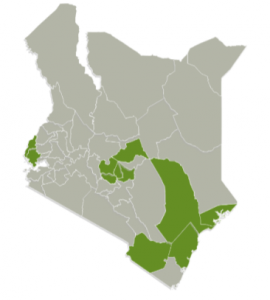| CATEGORY: | CSO |
| CSA PROJECT: | 1. Securing the long-term future of Kenya’s largest freshwater wetland. (2019-2021). Funded by Darwin Initiative 2. Balancing water services for development and biodiversity in the Tana-Delta. (2017-2021). Funded by Darwin Initiative 3. Reduce the depletion of forested IBAs and contribute to the realization of best participatory forest management practices for the benefit of all. (2018-2022). Funding by DANIDA-CISU. 4. Enhancing Integrated Natural Resource Management to Arrest and Reverse Current Trends in Biodiversity Loss and Land Degradation for Increased Ecosystem Services in the Tana Delta. (2019-2023). Funded by GEF 5. Community Resilience Building in Livelihood and disaster Risk management. (2019-2023). Funded by EU through CISP 6. Capacity Building and Lobby and Advocacy for Climate Change adaptation in Coffee Sector. (2018-2019). Funded by Rain Forest Alliance. |
| SCALE: | County |
| LOCATION: | Siaya, Busia, Tana River, Lamu, Kilifi, Taita-Taveta, Meru, Murang’a, Embu, Kirinyaga, Nyeri |

Summary of Actions
- Training of community/extension officers/policy makers
- Lobby and advocacy
- Awareness creation
- Supporting establishment of farmer field school in Tana Delta
- Livelihood diversification ventures (bee keeping, butterfly farming, improved chicken and goats breeds, climate smart agriculture inputs, fish farming & fish food processing equipment & training etc)
- Establishment of tree nurseries & tree planting
- Green Value Chain market linkages
Context
Nature Kenya-The East Africa Natural History Society (EANHS) is keen on conservation of Key Biodiversity Areas (KBAs), connecting people with nature & encouraging ecological sustainability.
Objective
Securing the long-term future of Kenya’s largest freshwater wetlands
Objective: To secure globally important biodiversity and local livelihoods in Kenya’s Yala Wetland
2. Balancing water services for development and biodiversity in the Tana-Delta
3. Objective: To encourage balancing of water services for development and biodiversity in the Tana-Delta
4. Reduce the depletion of forested IBAs and contribute to the realization of best participatory forest management practices for the benefit of all Objective: Building sustainability and climate change resilience around forest IBAs
5. Enhancing Integrated Natural Resource Management to Arrest and Reverse Current Trends in Biodiversity Loss and Land Degradation for Increased Ecosystem Services in the Tana Delta, Kenya
Objective: To Enhance Integrated Natural Resource Management to Arrest and Reverse Current
Trends in Biodiversity Loss and Land Degradation for Increased Ecosystem Services in the Tana Delta, Kenya
6. Capacity Building and Lobby and Advocacy for Climate Change adaptation in Coffee Sector
Objective: Mainstreaming Climate Smart Agriculture and Ecosystem Based Adaptation into the
Coffee Sector Value Chain
Key Interventions
| FARM LEVEL | TARGET (NO OF FARMERS) | INDICATORS MONITORED |
| Soil management | – CSA Excellence centres established
– Number of farmers trained on the CSA Excellence centres – Number of trainings held |
|
| Smart water management | – CSA Excellence centres established
– Number of farmers trained on the CSA Excellence centres |
|
| Renewable energy | – Use of solar powered technology in agricultural equipment in the CSA Excellence Center
– Adoption of solar powered equipment by farmers for their farming activities |
|
| BEYOND FARM LEVEL | TARGET BENEFICIARIES | INDICATORS MONITORED |
| Gender (Youth and Women inclusion in CSA) | Youth and women | – Number of members that CSAYN has (because all of our members are youths)
– Number of female members that CSAYN has – Number of activities in institutions of higher learning for students taking agricultural courses – Number of Programs and activities on youth engagement in CSA |
Participation In Key Climate & Agriculture Networks
Kenya Coffee Platform (KCP), Kenya Coffee Producers Association (KCPA), Community Forest Associations (CFAs), Council of Site Support Groups (SSGs), CSA Multi-Stakeholder Platform, Council of Governors (CoG), Conservation Alliance of Kenya
Involvement in CSA
Relevance of CSA MSP to Work
- Policy formulation
- Knowledge dissemination
- Coordination and networking
- Communication
- Financing of climate smart agriculture actions
- Information about CSA
- Networking
- Learning and exchange
- Reporting and showcasing
- Influence policy environment
Recommendation On Ways To Support MSP
- Developing specific climate smart agriculture policies, legislations, strategies, plans,
- dissemination of climate smart agriculture knowledge and technologies
- developing capacities of key actors involved in climate smart agriculture implementation
- Mobilizing actors and facilitating dialogue on climate smart agriculture issues/actions?
- Involved in supporting coordination of actions
What approaches are you using to implement CSA
- Agroecology
- Conservation Agriculture
- Climate Smart Farms/Villages
- Sustainable Agriculture
- Sustainable Land Management
- Landscape Management
- Good agricultural Practices
- Ecosystem based adaptation
Lessons learned and challenges in implementation of CSA project
- Lessons: Multi-agency approach (all government duty bearers and the local community) at all stages of the project is key for CSA/EBA
- Success: The strategy of facilitating County Governments, National Government and Agencies, and the local community groups and farmers to execute program components increases efficiency in achieving desired outcomes
- Challenges: Lack of existing coordination units to host and report on project activities, financing, breakdown of research-farmer information dissemination
CONTACT PERSON
- Name: Dr. Paul Matiku
Email Address: matiku@naturekenya.org
Mobile: +254 771343138
Telephone: +254 3537568
